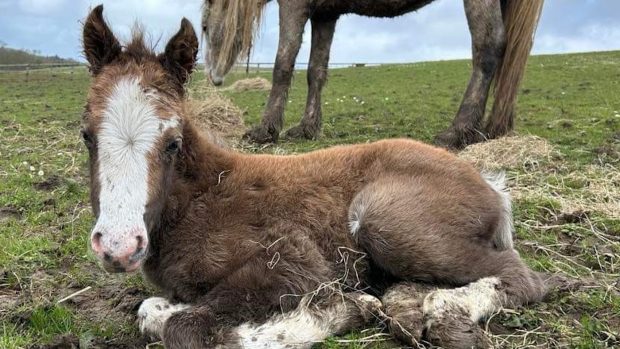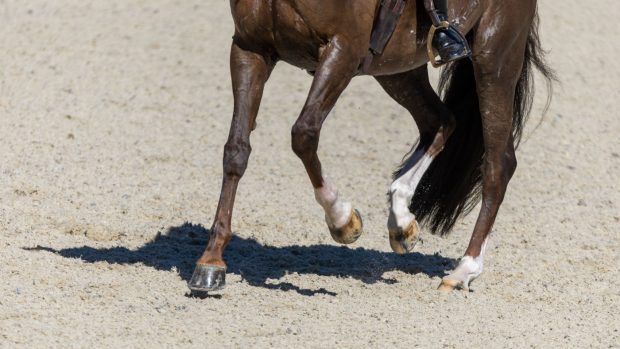Yearly visitor numbers to Morocco more than doubled between 2000 and 2010, and the government aims to double visitor numbers again by 2020. However, alongside the luxurious new spa hotels and nightclubs, there are an estimated 1,760,000 working equines helping poverty-stricken owners.
The value of good equine welfare and its benefits in turn for the animals’ owners was discussed at length at the International Colloquium of Working Equids last month. SPANA was heavily involved in the three-day event, hosted by World Horse Welfare, with directors from the seven core countries in which it operates at present.
SPANA was founded in London in 1923 and began its work in Morocco two years later, helping to improve the welfare of working animals. The charity now has six centres across the country. Its work has two main aims — treating sick and injured horses, mules and donkeys; and educating owners and future generations about the importance of welfare.
A stitch in time…
Last year, SPANA’s veterinary team — led by Moroccan-trained vets — provided over 65,000 treatments to animals. The work is varied, but malnutrition, colic and trauma wounds are common ailments. In the SPANA centre in Marrakech I saw vets treat a horse called Mabrouka, who had deep lacerations on his fetlocks, knees and face after falling on the road from carrying too heavy a load.
Mabrouka had fallen in the morning and his young owner Khalid had brought him straight to the open clinic that is run each day.
“The people in my village told me to treat it with oil. But I wanted him treated with proper medicine so I brought him to SPANA,” he said.
Dr Boubker El Mouhaine, one of the vets working with SPANA in Marrakech, cleaned and bandaged the wounds. The horse was then sent home with strict instructions to be brought back every three days to have the wounds cleaned and bandaged (pictured below).
The treatment means that the horse will be able to go back to work within a number of weeks, protecting not only the income of his owner’s family but also the horse from a potentially fatal infection.
Difficult situations
Euthanasia is an unavoidable topic in the charity’s work. The primary problem that staff face is persuading owners that it might be the best option. One of the in-patients at the centre in Marrakech was suffering from azoturia, which had reached such an extreme state that it looked unlikely that the horse would recover. However, the vet was forced to wait for the owner to come back and visit the horse the next day before a decision could be taken.
“We have to wait for an owner’s permission,” said Dr El Mouhaine. “In extreme cases with colic or infections we can go ahead and show them pictures, or do a postmortem to prove to them it was necessary. The problem with this case is that I would not be able to explain it. So we have to wait.”
SPANA’s success is based upon mutual respect between the Moroccan vets and the people who use the charity’s services. However, the harsh reality is that sometimes these cases are unavoidable.
Educating owners
Through its work, SPANA also tries to educate owners on the importance of looking after their animals.
“Only half of what we do is veterinary work,” said Professor Hassan Alyakine, country director for SPANA Morocco. “Much of the rest is educating owners. I always encourage all the vets to talk to the owners as much as possible.”
The importance of education was highlighted by a case of severe laminitis at the Casablanca centre, which I also visited.
A bay horse had been treated for lameness at home for a month before his owner decided to bring him to SPANA (pictured below).
Vets quickly ascertained that he was suffering from laminitis, which was thought to be the result of being fed too much grain.
The horse had to be forced to stand due to the severity of the pain, and visibly shook from the effort of placing weight on his front feet.
The vets confirmed that both of his pedal bones had rotated and that he would be unlikely to recover. A discussion about the animal’s future was due to take place the next day.
“It’s a great shame because acute laminitis responds very well to treatment,” said Prof Alyakine.“There shouldn’t be a need to treat cases like this because they are avoidable.”
The future
As well as talking in detail to all of the owners who bring horses to the centres, the charity runs an education programme that reaches more than 20,000 children a year.
The scheme, which is run most afternoons across the country, is divided into two parts — basic care, and empathy for animals.
The care part of the workshops teaches children about animals’ five basic needs — food and water, safety, health, shelter and freedom.
The second part explains to children that animals are sentient beings and therefore need to be cared for and respected.
“It is easier to educate children than it is to change the mindset of older owners,” said Prof Alyakine. “There have already been improvements, but we need to change the place of equines in society and this takes time.”
SPANA in numbers
- 1,760,000 — the number of working equines in Morocco
- 1925 — the year the charity began work in Marrakech
- 1986 — the year the education programme was started
- 2011 — the year Casablanca established a riding for the disabled programme
- 16 — the number of vets in Morocco
- 65,324 — the number of treatments provided to animals in 2013
Veterinary Education
SPANA has also been behind the introduction of equines to the syllabus at the only veterinary school in the country, in Rabat. All students are now required to do a three-week placement at one of the charity’s centres during the course of their degree.
“It is very important because it gives the students a chance to get hands-on practice with animals,” said Prof Hassan Alyakine.
The charity also takes volunteer graduates from the UK to work in its centres in Morocco. The British graduates spend a minimum of a month at one of the centres, giving them the opportunity to share expertise and learn from the Moroccan vets.
➤ For more information about SPANA visit: www.spana.org
➤ For blogs and videos from the trip visit: www.horseandhound.co.uk/SPANA
First published in Horse & Hound magazine on 7 August 2014







